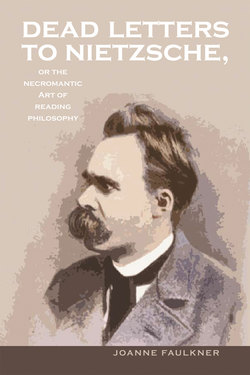Читать книгу Dead Letters to Nietzsche, or the Necromantic Art of Reading Philosophy - Joanne Faulkner - Страница 5
На сайте Литреса книга снята с продажи.
ОглавлениеACKNOWLEDGMENTS
...................................
Earlier versions of some of the material in this book have been published in the form of articles, and I gratefully acknowledge the assistance I received from the journal editors and anonymous readers who contributed to the improvement of this work, through their advice and commentary. The articles in question are: “‘Keeping It in the Family’: Sarah Kofman Reading Nietzsche as a Jewish Woman,” Hypatia: A Journal of Feminist Philosophy 23[1] (January–March 2008): 41–64; “The Vision, the Riddle, and the Vicious Circle: Pierre Klossowski Reading Nietzsche’s Sick Body through Sade’s Perversion,” Textual Practice 21[1] (March 2007): 43–69 (at www.informaworld.com); “The Body as Text in the Writings of Nietzsche and Freud,” Minerva 7 (November 2003): 94–124.
I would also like to acknowledge the Institute for Advanced Study at La Trobe University, Melbourne, for their Postgraduate Writing-up Award, which I received in 2006 to support the development of my book proposal; and the Killam Trust for awarding me the Izaak Walton Killam Postdoctoral Fellowship at the University of Alberta, which supported the writing up of the manuscript.
I wish to extend my heartfelt gratitude to my doctoral supervisor, Philipa Rothfield, whose thoughtful engagement with my ideas, pastoral support, rigorous interrogations, and continuing friendship have sustained this project. I am indebted to George Vassilocopoulos for reading and commenting on an early draft of the entire manuscript, and Matthew Sharpe and Ashley Woodward for their valuable feedback on drafts of chapters. Thanks also to David McNeill for allowing me to access some of his unpublished writing, and for provoking a revision of my thinking about the relation between “master” and “slave” morality in Nietzsche’s work; and to Daniel Smith, for providing me with an advance copy of his Diacritics article, and prior to that with speaking notes for a paper he delivered in Sydney in 1998, which were invaluable to me while working through Klossowski’s somatic vocabulary. Thank you to the postgraduate community in Philosophy and Gender, Sexuality and Diversity Studies, at La Trobe University, to whom versions of chapters were presented as papers for their colloquia. I am also grateful to Daniel Conway, Rosalyn Diprose, and David Pettigrew for their generous support of this work in doctoral-thesis form, as its examiners, and later as mentors.
Finally, I would like to thank my husband, best friend, and tireless reader and supporter of my work, Peter Chen, without whose love, forbearance, and dependable parenting to our children, this book would not have seen its way to completion.
